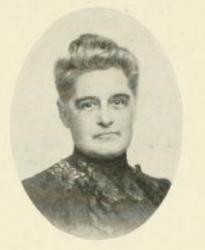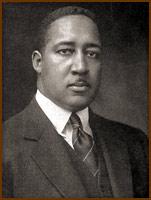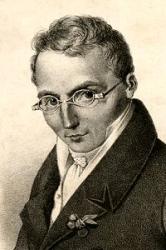Planning worship?
Check out our sister site, ZeteoSearch.org,
for 20+ additional resources related to your search.
- |
User Links
Person Results
‹ Return to hymnal



Export as CSV
May P. Hoyt

1849 - 1923 Hymnal Number: 376 Author of "Here at Thy Table, Lord" in Great Songs of the Church (Revised) May (Mary) Pierpont Hoyt, born 1849 in South Avon, N.Y., daughter of Uriah Grandison Hoyt and Emma G. Pierpont. Her mother died in 1856 when she was 7 years old. She attended Oread Collegiate Institute in Worcester, Mass., a school for women, from 1862-1863. She then returned to Rochester, N.Y. and attended Livingston Park Seminary, another school for women. She graduated from Livingston and taught there for two years, and then taught for two years in the public schools. She later moved to Albany, living with a friend for twenty years until the friend remarried. she then lived at the Albany Hospital. She claims to have written two hymns appearing in "Church Hymnary" (edited by Edwin A. Bedell, published in 1900 by Maynard, Merrill & Co.) Nos. 736 and 985. #736 is "Here at Thy table, Lord" and #985 is "Though life be long and life be sad." She died in November 11, 1923 in Albany and was buried at Mount Hope Cemetery in Rochester, N.Y.
Dianne Shapiro, from History of the Oread Collegiate Institute, Worcester, Mass. (1849-1881): with biographical sketches" by Martha Burt Wright and Anne M. Bancroft (New Haven, Conn.: Tuttle, Morehouse & Taylor Co., 1905; Ancestry.com record for Uriah Grandison Hoyt, 1824-1901; and Find A Grave Memorial website (both accessed 3/19/2021)
===================
Hoyt, May Pierpont (late 19th century?). Disciple (?). Nothing is known of this writer except what can be inferred from the appearance of one hymn credited to this name, "Here at thy table, Lord, This sacred hour," a communion hymn written in the meter of, and printed with the tune of, "Break thou the bread of life," and apparently intended to supplant Lathbury's 1877 Bible hymn often used as if it were referring to the bread of the Lord's Supper. "Here at thy table" has been reported as early as 1889, and it has appeared quite generally in Disciple books since as early as 1905, but seldom in books of other denominations. --George Brandon, DNAH Archives
May P. Hoyt
Franz Xaver Schnyder von Wartensee
1786 - 1868 Person Name: Xavier Schnyder von Wartensee Hymnal Number: 353 Composer of "HORTON" in Great Songs of the Church (Revised)
Franz Xaver Schnyder von Wartensee
John W. Work

1901 - 1967 Person Name: John W. Work, Jr. Hymnal Number: 228 Adapted of "Were You There" in Great Songs of the Church (Revised) John Wesley Work III (1901-1967)
Composer, educator, choral director, and ethnomusicologist John Wesley Work III was born on June 15, 1901, in Tullahoma, Tennessee, to a family of professional musicians. His grandfather, John Wesley Work, was a church choir director in Nashville, where he wrote and arranged music for his choirs. Some of his choristers were members of the original Fisk Jubilee Singers. His father, John Wesley Work Jr., was a singer, folksong collector and professor of music, Latin, and history at Fisk, and his mother, Agnes Haynes Work, was a singer who helped train the Fisk group. His uncle, Frederick Jerome Work, also collected and arranged folksongs, and his brother, Julian, became a professional musician and composer.
Work began his musical training at the Fisk University Laboratory School, moving on to the Fisk High School and then the university, where he received a B.A. degree in 1923. After graduation, he attended the Institute of Musical Art in New York City (now the Julliard School of Music), where he studied with Gardner Lamson. He returned to Fisk and began teaching in 1927, spending summers in New York studying with Howard Talley and Samuel Gardner. In 1930 he received an M.A. degree from Columbia University with his thesis American Negro Songs and Spirituals. He was awarded two Julius Rosenwald Foundation Fellowships for the years 1931 to 1933 and, using these to take two years leave from Fisk, he obtained a B.Mus. degree from Yale University in 1933.
Work spent the remainder of his career at Fisk, until his retirement in 1966. He served in a variety of positions, notably as a teacher, chairman of the Fisk University Department of Music, and director of the Fisk Jubilee Singers from 1947 until 1956. He published articles in professional journals and dictionaries over a span of more than thirty years. His best known articles were "Plantation Meistersingers" in The Musical Quarterly (Jan. 1940), and "Changing Patterns in Negro Folksongs" in the Journal of American Folklore (Oct. 1940).
Work began composing while still in high school and continued throughout his career, completing over one hundred compositions in a variety of musical forms -- for full orchestra, piano, chamber ensemble, violin and organ -- but his largest output was in choral and solo-voice music. He was awarded first prize in the 1946 competition of the Federation of American Composers for his cantata The Singers, and in 1947 he received an award from the National Association of Negro Musicians. In 1963 he was awarded an honorary doctorate from Fisk University.
Following Work's collection Negro Folk Songs, the bulk of which was recorded at Fort Valley, he and two colleagues from Fisk University, Charles S. Johnson, head of the department of sociology (later, in October 1946, chosen as the university's first black president), and Lewis Jones, professor of sociology, collaborated with the Archive of American Folk Song on the Library of Congress/Fisk University Mississippi Delta Collection (AFC 1941/002). This project was a two-year joint field study conducted by the Library of Congress and Fisk University during the summers of 1941 and 1942. The goal of the partnership was to carry out an intensive field study documenting the folk culture of a specific community of African Americans in the Mississippi Delta region. The rapidly urbanizing commercial area of Coahoma County, Mississippi, with its county seat in Clarksdale, became the geographical focus of the study. Some of the correspondence included in this collection between Work and Alan Lomax, then head of the Archive of American Folk Song, touches on both the Fort Valley and the emerging Fisk University recording projects.
John Wesley Work died on May 17, 1967.
--memory.loc.gov/ammem/ftvhtml/
John W. Work
John H. Gower
1855 - 1922 Hymnal Number: 582 Composer of "GOWER'S LITANY" in Great Songs of the Church (Revised)
John H. Gower
Arthur Henry Dyke Troyte
1811 - 1857 Person Name: Arthur H. D. Troyte Hymnal Number: 374 Composer of "TROYTE'S CHANT, No. 1" in Great Songs of the Church (Revised) See Acland, Arthur H. Dyke (Arthur Henry Dyke), 1811-1857.
Arthur Henry Dyke Acland changed his last name to Troyte in 1852 when he succeeded to the estates of Rev. Edward Berkeley Troyte. A part of the requirement for this succession was that he change his last name to Troyte.
Arthur Henry Dyke Troyte
John Ireland Tucker
1819 - 1895 Person Name: J. Ireland Tucker Hymnal Number: 21 Adapter of "CANONBURY" in Great Songs of the Church (Revised) Episcopal priest and church musician
John Ireland Tucker
Ferdinand Hérold

1791 - 1833 Person Name: Louis J. F. Herold Hymnal Number: 608 Composer of "MESSIAH" in Great Songs of the Church (Revised) Full name: Louis Joseph Ferdinand Hérold
Ferdinand Hérold
Alexander Means
1801 - 1883 Hymnal Number: 225 Attributed of "What Wondrous Love is This?" in Great Songs of the Church (Revised)
Alexander Means
J. Howard Entwisle
1865 - 1901 Hymnal Number: 650 Composer of "SWEETER THAN ALL" in Great Songs of the Church (Revised) J Howard Entwisle USA 1865-1901. Born in PA, he became a musician and songbook editor-compiler in Philadelphia, PA, in the 1890s. He collaberated with William J Kirkpatrick, also of Philadelphia, promoting gospel songs. He helped compile “Songs of love and praise #4”, then later “Songs of love and praise #5”. Other published works were: “Bright melodies” (1899), “Heavenly sunlight” (1900), “Exalted praise” (1901). He died in Philadelphia.
John Perry
J. Howard Entwisle


 My Starred Hymns
My Starred Hymns


